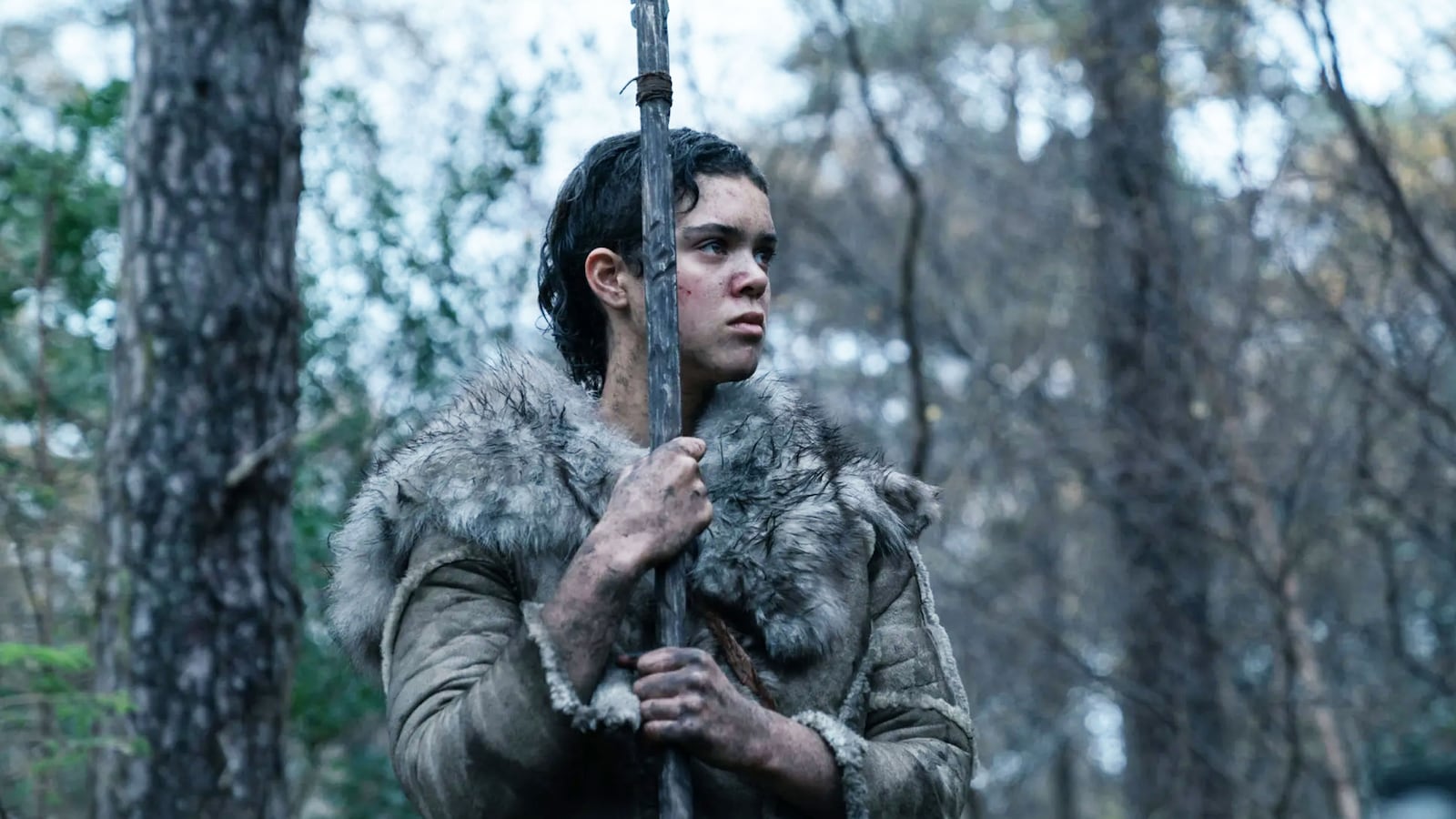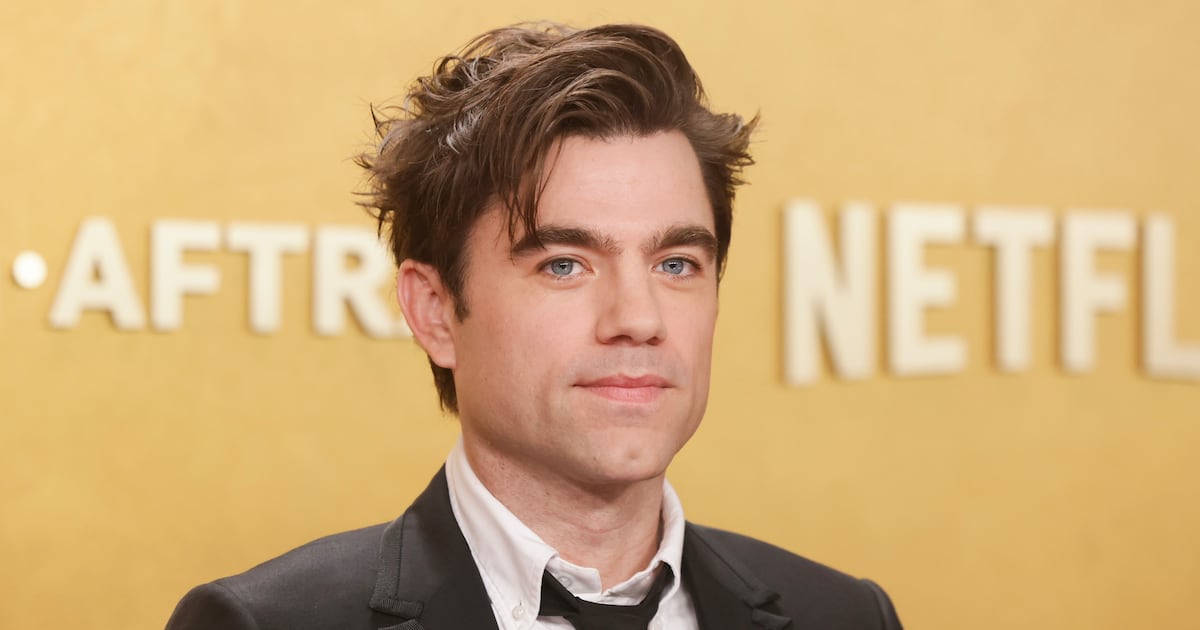Evolutionary survival-horror the likes of which would have pleased Jack London, Out of Darkness (in theaters Feb. 9) journeys 45,000 years into the past to locate the monstrous origins of humanity. British director Andrew Cumming’s maiden feature is a raw, rugged, stripped-down thriller with an overpoweringly eerie atmosphere that helps compensate for its lack of nerve-rattling scares and a finale that veers perilously close to preachiness. Equal parts Quest for Fire, Prey, The Descent, and even Prometheus, it’s a midnight movie that recognizes that there’s no existence without sacrifice, and no birth without death.
Around a blazing campfire surrounded by inky blackness, a towering ridgeline barely visible in the distance, six nomads in furry animal hides huddle for warmth. As a bedtime story, an elder named Odal (Arno Lüning) tells young Heron (Luna Mwezi) their own tale, in which they were guided away from their barren, starvation-wracked home by their leader (and Herron’s father) Adem (Chuku Modu), an imposing warrior who sought to discover fertile valleys, warm caves, and plentiful animals. Rejecting the counsel of his clan’s seniors, headstrong Adem brought them across the ocean to these distant shores, only to learn that this place was “cursed,” devoid of shelter or food. Worse, Odal claims that “evil, bloodthirsty things” lurk in the shadows, and that “the danger in bringing light to a dark place is that you might find out what lives in the darkness.”
Adem doesn’t care for such talk and since he’s the alpha upon whom everyone relies for safety and nourishment, Odal’s criticisms aren’t much more than empty, bitter blather. Adem’s main priority is Heron and, then, his mate Ave (Iola Evans), who’s pregnant with his second child. His brother Geirr (Kit Young) is a loyal if not quite fearsome hunter, and he has a soft spot for the sixth member of their troupe—a stray named Beyah (Safia Oakley-Green) whom they picked up some time earlier. Together, they’re a motley crew trying to make it to the next day, and when Out of Darkness begins, that process involves searching for a cave that might protect them from this ancient land’s damp cold, hostile gusts and consuming fog.
Out of Darkness routinely juxtaposes its tiny protagonists and their vast, barren environs, all inhospitable plains and treacherous hills, which lends the material its mythic grandeur and menace. Adam Janota Bzowski’s score is full of tribal drumbeats and low, moaning tones, yet the director places an equal premium on silence, especially during his more suspenseful sequences. The first-time filmmaker knows how to build tension and his debut’s finest moments are those in which the crunch of footsteps on hard soil, the pitter-patter of water droplets on slick rocks, the unsettling howls of the wind, and the agitated panting of scared men and women are all that break up the ominous quiet. That its centerpieces’ payoffs aren’t as good as their set-ups is unfortunate, but Cumming’s mastery of mood is enough to keep the proceedings taut throughout.
If Adem projects confidence to his flock, he’s still perpetually on his guard, especially once he and Geirr find the stripped-bare carcass of a wooly mammoth. More alarming are the strange shrieking noises and attendant rustling sounds coming from the dark surrounding their campfire each night—indications that a predator is waiting for an opportunity to strike. While the identity of that hungry beast is left mysterious for much of Out of Darkness, there’s plenty of conjecture about its true nature, as well as why it’s appeared. Odal’s theory, at least, is that it’s attracted to the smell of Beyah, who’s just begun menstruating, although this seems to be a byproduct of both his superstitious beliefs and his prejudice against women and outsiders.
Ruth Greenberg’s script couches its exposition in believable conversations, and at 87 minutes, Out of Darkness moves fleetly, wasting no time on extraneous matters. Whereas it begins with creeping dread, the film shifts into a more urgent (if no less oppressive) gear when Heron is snatched during a midnight raid by the unseen beast, compelling Adem—against the common-sense protestations of those he’s responsible for—to race off into a nearby forest that he himself had previously admitted was best avoided. In this thick, claustrophobic milieu, where the trees’ leafless branches protrude like daggers, the migrants are even easier prey for the slayer hunting them. Nonetheless, Cumming refrains from divulging his principal secret until the last possible moment, with the creature’s inhuman screeching and bellowing (and even misty glimpses of its giant beak-like head and feathery body) suggesting that Odal is right to assume it’s a “demon” that can only be satisfied with a horrible ritualistic offering.
Cannibalism eventually factors into Out of Darkness, literally and figuratively, thereby affording the action its gnarliness as well as its thematic heft. The film implies that consuming each other is what humans do—to get ahead, to eliminate threats, or simply to feel more at ease—and denying it or crying about it is a surefire way to guarantee an upcoming spot on the proverbial chopping block. Whether loyal or treacherous, altruistic or selfish, the ones who endure this world are the ruthless, and if that means stamping out the competition, then so be it. Consequently, it comes as some surprise that in their closing minutes, Cumming and Greenberg try to have it both ways via some moralizing inner-monologue narration. After seemingly embracing the fact that some have to perish so the rest may continue onward, their attempt to reconfigure everything into a parable about intolerance is a leaden misstep that clashes with everything that’s come before, and concludes things on a mildly eye-rolling note.
Minus its clumsy last five minutes, however, Out of Darkness is a white-knuckle portrait of the tremendous lengths to which individuals must go in order to persist. Presenting a stark vision of paleolithic life in all its grungy, callous, mystical glory and terror, it heralds the arrival of a promising new genre-cinema voice in Cumming, whose command of tone and momentum will likely pay even greater dividends in his own not-too-distant future.






